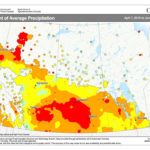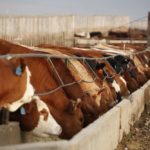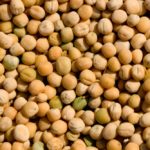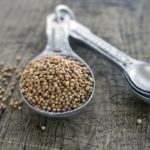Reading Time: < 1 minute MarketsFarm — Canada’s Prairies should see higher-than-normal precipitation and generally average temperatures during the 2020 growing season, according to a forecast from Scott Kehler of Weatherlogics. Speaking Thursday at CropConnect in Winnipeg, Kehler said “there’s not really a strong pattern one way or the other” when it comes to the temperature outlook. The Weatherlogics forecast […] Read more

Average Prairie heat, more rain in summer forecast

Variable Prairie weather makes for uncertain spring ahead
If nothing else, a rainy harvest season helped replenish topsoil moisture
Reading Time: 2 minutes MarketsFarm — Late-season rains wreaked havoc on the 2019 harvest season but were helpful in restoring topsoil moisture to key growing regions in the Prairies. Since snow coverage has been variable across the Prairies so far in 2020, however, the growing season may get off to a rocky start. “If we take a look at […] Read more

Wet fall raises risk of Manitoba spring flood
Reading Time: < 1 minute MarketsFarm — Manitoba’s Red River Valley is very wet heading into the winter freeze, but it’s still too early to say if the saturated soils will lead to flooding in the spring, according to provincial forecasters. The Manitoba government on Wednesday took the unprecedented step of opening the Red River Floodway, marking the first time […] Read more

Prairie drought reaches tipping point
Reading Time: 2 minutes MarketsFarm — The Prairie provinces have been under the influence of a large ridge of high pressure for a number of weeks, which has produced prolonged dryness with little precipitation. That high pressure system has pushed low-pressure, precipitation-carrying systems to the south, where the U.S. Midwest has already received significant rain. Environment Canada estimated the […] Read more

Feed weekly outlook: Grain prices strong as dry weather persists
Reading Time: < 1 minute MarketsFarm — Producers are anxious to stock up on feed grains as weather across the Prairies has remained dry. “We’ve been seeing buyers being quite aggressive [when] bidding on all feed grains,” explained Nelson Neumann of Agfinity in Lethbridge. “Nobody wants to be caught without anything over the summer.” With little precipitation in the forecast, […] Read more

Canadian crop development behind average
Reading Time: < 1 minute MarketsFarm — Crop development is running behind average across much of Canada, with excessive moisture delaying seeding in Ontario and dryness slowing crop development across the Prairies. That’s according to the latest satellite data from the federal Crop Condition Assessment Program (CCAP), created in partnership between Statistics Canada and Agriculture and Agri-Food Canada. Crop development […] Read more

Feed weekly outlook: Feed grain prices flagging
Reading Time: 1 minute MarketsFarm — Feed grain prices have softened across the Prairies, as seeding is well under and many producers have the coverage they need until new crops begin to come off the field in August. Markets are fundamentally bearish right now, as farmers with enough coverage can wait until prices get even lower when new crop […] Read more

Pulse weekly outlook: Planted green, yellow peas lower prices
Reading Time: < 1 minute MarketsFarm — Green and yellow pea seeding is well underway across the Prairies, causing new-crop prices to slide marginally while spot prices hold firm. As Dale McManus, a broker with Johnston Grain at Welwyn, Sask., explained, seeded acres and new crop prices have an inverse relationship: as seeded acres rise, new crop prices fall. Producers […] Read more

Mustard acres to decrease, but yield outlook strong
Reading Time: < 1 minute MarketsFarm — The most recent principal field crop acreage report from Statistics Canada predicts mustard seed area will drop from approximately 500,000 acres to 400,000 in 2019, concentrated mainly in southwestern, south-central, and west-central Saskatchewan. Although fewer acres are expected to be seeded, prime mustard-growing areas in Saskatchewan and Alberta saw precipitation in recent weeks, […] Read more

CBOT weekly outlook: Weather, trade talks strong influences
Reading Time: 2 minutes MarketsFarm — Forecasts calling for more precipitation in the U.S. and trade talks with China are having powerful effects on prices at the Chicago Board of Trade this week from where one analyst sits. Steve Georgy of Allendale Inc. in McHenry, Ill. said the forecast has been driving soybean prices to new contract lows. Already […] Read more


